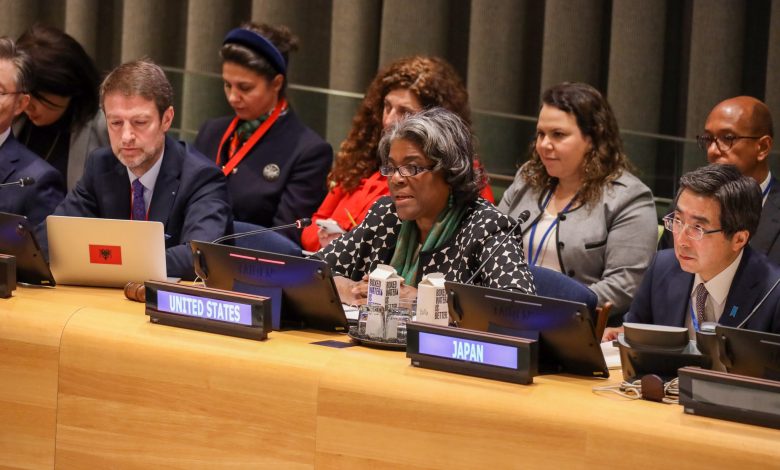Remarks by Ambassador Linda Thomas-Greenfield at a UN Security Council Arria Formula meeting on human rights in the DPRK

Ambassador Linda Thomas-Greenfield
US Representative to the United Nations
New-York, New-York
March 17, 2023
AS DELIVERED
Thank you Mr Turpin and Ms Salmon for your insightful briefings. And thank you Mr. Kim and Ms. Lee for speaking up and giving a voice to the voiceless. I would also like to express my deep appreciation to Albania, Japan and the Republic of Korea for their close partnership on this important Arria.
Yesterday I met with three defectors from North Korea, each of whom told me their story.
One of them told me that she had no idea what freedom was until she left North Korea. She couldn’t even imagine that she had human rights.
Another told me how she tried to flee North Korea three times. Twice she was arrested and tortured, denied food, even denied the right to use the toilet. But what was extraordinary – she decided to flee a third time to save her sons. But she was carrying a poison pill. Because if she fails, she would rather die than be imprisoned and tortured again.
The third woman I spoke to left North Korea when she was just seventeen. She only had one year of elementary school.
She told me how she was forced to attend public executions. Watching a woman hanging on a cross being shot by the regime. The woman’s husband and four-year-old child were forced to stand and watch as their mother was killed. When the shots rang out and her body collapsed, her family couldn’t make a single sound unless they wanted to be killed themselves.
I told all three women I spoke to to be proud. And I say the same to Mr. Kim and Ms. Lee – that their persistence and courage was remarkable – and that I would share their stories to bring the world into the spotlight.
Because for every terrible story we hear, there are countless stories we will never hear—that will never see the light of day.
This is of course intentional.
The regime in Pyongyang is doing everything it can to hide its atrocities from the outside world.
But they failed again and again.
We have all seen the evidence – including the report of the UN Commission of Inquiry and much since – of the DPRK’s systemic, widespread and gross human rights abuses.
At this moment, the DPRK has more than 80,000 people in detention camps — where political prisoners face torture, starvation, forced labor, arbitrary or summary executions, and gender-based violence — including forced abortions.
And to be clear, the DPRK’s horrific actions do not stop at its borders.
Reports indicate that the regime has carried out cross-border repression including intimidation, surveillance, forced repatriations and assassinations – sometimes carried out with the support of other governments and sometimes without the consent of other governments, an indication of the total lack of respect for the state DPRK sovereignty.
There are still hundreds of unresolved cases of reported international abductions and enforced disappearances by the DPRK government from outside its territory, including from Japan and the Republic of Korea, as well as prisoners of war and detainees.
But even in the face of these gross human rights violations, some Security Council members argue that this issue is not within the Council’s remit – it is not our mandate – we have been told. They argue that somehow this is not an issue of international peace and security.
But the link between the regime’s widespread human rights abuses and its threats to our collective security could not be clearer.
Pyongyang’s WMD and ballistic missile programs, as confirmed by several Security Council resolutions, pose an undeniable threat to international peace and security and are intrinsically linked to the regime’s human rights abuses.
In the DPRK, the pursuit of weapons of mass destruction always – always overrides the human rights and humanitarian needs of its people.
The regime’s use of forced labor fuels its illicit weapons program.
Food distribution policies favor the military at the expense of more than 10 million North Koreans who are food insecure.
And the totalitarian control of society ensures that the regime can spend excessive resources on weapons development without public opposition.
Kim Jong Un has chosen ammunition over food, missiles over humanity.
And in doing so, he has threatened the global proliferation regime.
Each and every member of the Security Council has the duty to prevent the DPRK from advancing its illicit weapons of mass destruction and missile programs and the duty to address the gross violations of human rights which, in addition to violating the Universal Declaration of Human Rights, are affecting our collective peace and security in Danger.
But the last time this issue was on the Council’s formal agenda was way back in 2017.
You might ask why? Because some council members are only too willing to shield the regime from accountability.
Even for today, a Permanent Member has prevented this meeting from being publicly broadcast on UN Web TV – breaking what has always been an agreement between Council members. It was another attempt to hide the DPRK’s atrocities from the world.
But let me say it was in vain. Because as you can see, we were undeterred – and never will be. This meeting will be public and visible to the whole world.
We will continue to speak out against the DPRK’s human rights abuses and threats to world peace.
They may be able to silence the voices of the DPRK people, but they cannot silence our voices.
For in truth there is power, and truth is justice.
Thank you very much.
###

